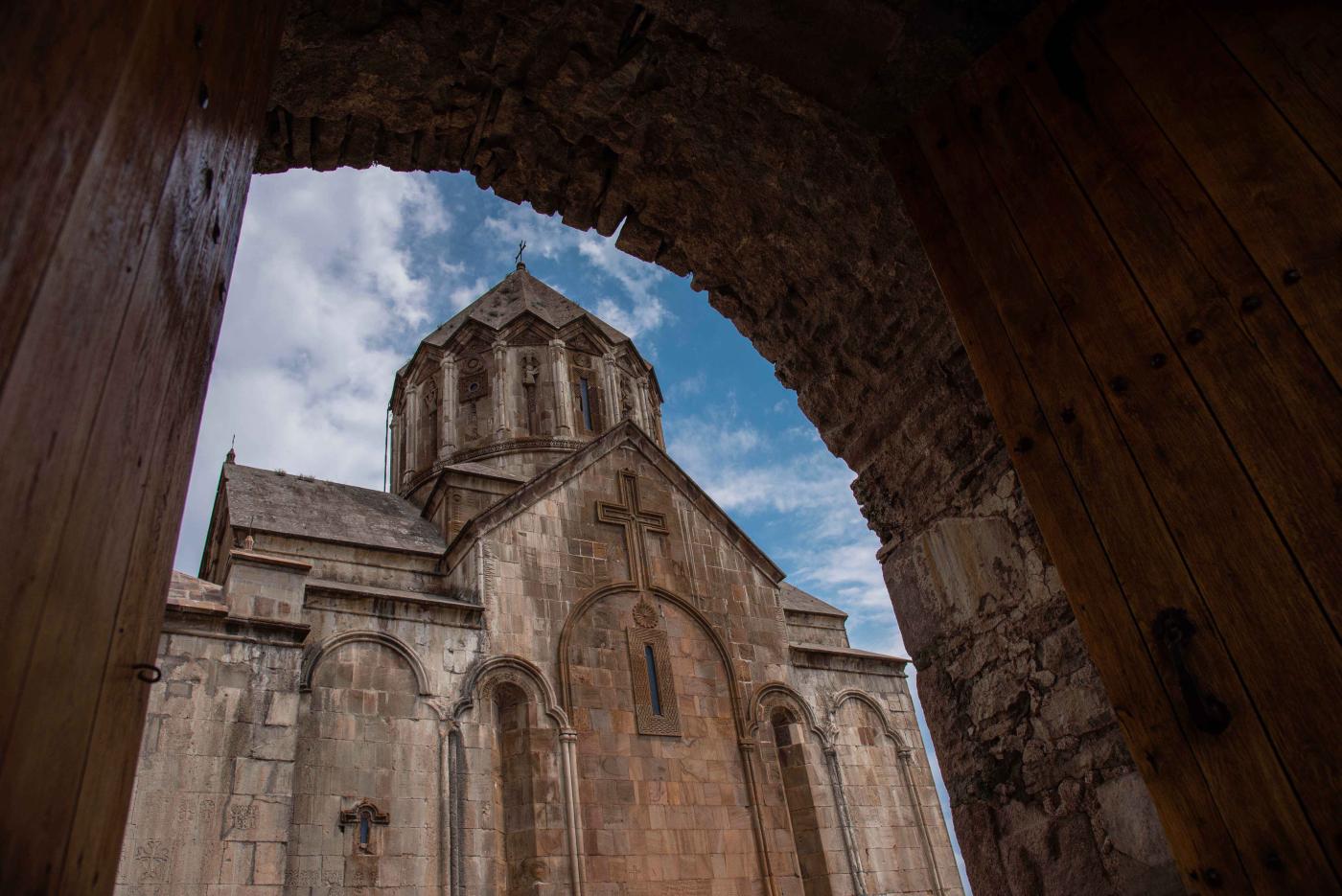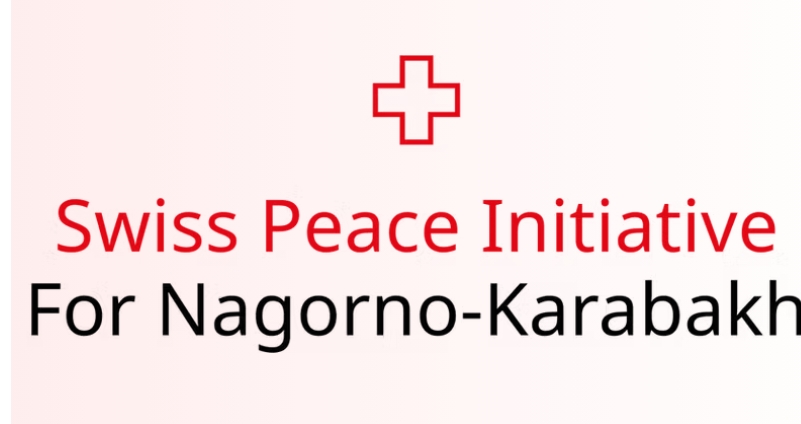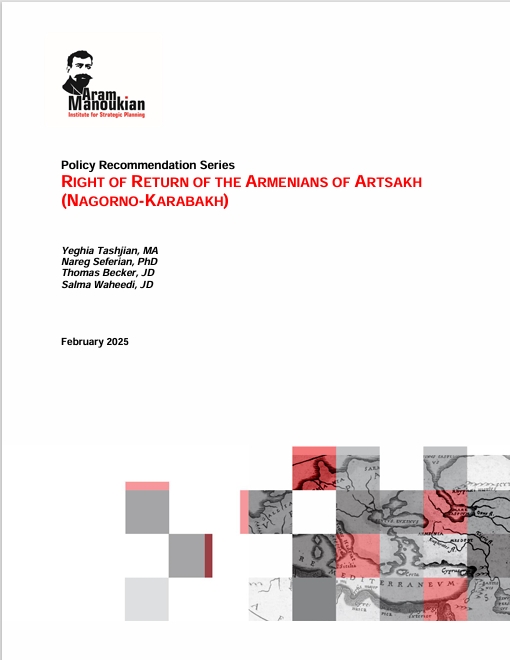WATERTOWN, Mass.—In February 2025, the Aram Manoukian Institute for Strategic Planning published its second policy recommendation series on the “Right of Return of the Armenians of Artsakh (Nagorno-Karabakh).”
The authors of the paper include Yeghia Tashjian, the Regional and International Affairs Cluster Coordinator for the Issam Fares Institute for Public Policy and International Affairs at the American University of Beirut and a columnist for the Armenian Weekly; Nareg Seferian, a Visiting Assistant Professor of Government and Foreign Affairs at Hampden-Sydney College; Thomas Becker, the Legal and Policy Director at the University Network for Human Rights; and Salma Waheedi, Lecturer on Law and Executive Director of the Program on Law and Society in the Muslim World at Harvard Law School and a Legal Advisor on the Middle East and North Africa at the University Network for Human Rights.
This timely paper examines the forced deportation of Armenians from Nagorno-Karabakh (also known as “Artsakh” in Armenian) by Azerbaijan, defining it as ethnic cleansing. Drawing from Freedom House’s comprehensive report on the topic and the resolution passed by the International Association of Genocide Scholars (IAGS) in September 2024, the authors conclude that Azerbaijan’s systematic attacks, forced displacement, and destruction of cultural heritage are elements of a premeditated campaign to expel Nagorno-Karabakh of its ethnic Armenians, triggering international legal obligations, including a sustainable right of return. The paper combines perspectives from Armenian and international experts in political science and human rights law to analyze the crisis’s historical, legal, and geopolitical dimensions.
The authors discuss the Armenian presence in the region from antiquity to the establishment of the Nagorno-Karabakh Autonomous Oblast under Soviet rule, the independence movement, and subsequent wars, focusing on the 2020 and 2023 conflicts. The international response, including statements from the European Union, United Nations, and International Court of Justice, highlights the obligation to ensure safe repatriation and protect Armenian rights and cultural heritage. The paper underscores key violations of international law, including breaches of the Universal Declaration of Human Rights, the International Covenant on Civil and Political Rights, and the Geneva Conventions. It advocates for accountability in international legal forums.
The paper offers actionable recommendations for the U.S. government to support the right of return, including securing international guarantees, advocating for the preservation of Armenian cultural sites, and holding Azerbaijani officials accountable for war crimes. It emphasizes the necessity of sustained international engagement, legal mechanisms, and Armenian government support to ensure the dignity, security, and cultural legacy of displaced ethnic Armenians, ultimately laying the groundwork for a just resolution and enduring peace in the region.
These recommendations focus on safeguarding the rights of displaced ethnic Armenians and urge Baku to provide conditions for the safe return of Nagorno-Karabakh’s indigenous inhabitants. If Baku fails to provide guarantees and conditions for a safe return, then Yerevan must support international efforts to prosecute Azerbaijani officials who are responsible for crimes and forced deportations. Finally, the Armenian government must engage with the United Nations Education, Scientific and Cultural Organization, and religious organizations to pressure Baku to preserve the Armenian cultural and religious identity in Nagorno-Karabakh by preventing the systematic destruction of centuries-old Armenian monuments, churches, and monasteries.
About the Institute
The Aram Manoukian Institute for Strategic Planning was formed to work with experts in various fields to develop plans for the future of the Armenian nation in Armenia, Artsakh, and the Diaspora. The Institute’s overarching vision is to work towards the creation of a prosperous and just society in Armenia, Artsakh, and the Armenian diaspora, where the rights and dignity of all individuals are respected, and where peace, democracy, and sustainable development are achieved.
The Institute will identify appropriate target audiences, including government officials, civil society organizations, academia, businesses, and the public, to ensure its work reaches various stakeholders. It will also build a diverse team with expertise from various fields, including academics, practitioners, individuals from the Armenian diaspora, and youth, to provide a holistic perspective in addressing the nation’s challenges. Additionally, it underscores the significance of developing partnerships and collaborations with government agencies, NGOs, research institutions, businesses, international organizations, and diaspora organizations to leverage resources and knowledge effectively. The Institute’s agenda will focus on pressing issues such as national security, economic development, education, good governance, health care, diaspora engagement, and environmental sustainability. By addressing these challenges through research-based insights and policy recommendations, the Institute will contribute toward the betterment of the Armenian nation.




